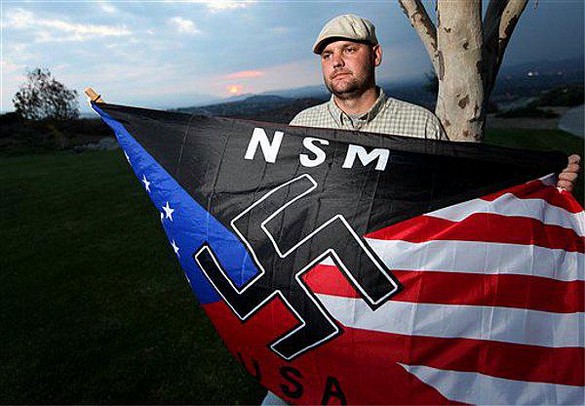A 12-year-old was found guilty of murder when the judge ruled that the boy, who killed his father at the age of 10, knew what he was doing when he pulled the trigger.

Sandy Huffaker / AP / File
A 12-year-old boy was found guilty of murder in a Los Angeles courtroom today. Though he was only 10 when he fatally shot his white supremacist father, the judge said that the child knew what he did was wrong, and is thus guilty of second-degree murder.
Riverside Superior Court Judge Jean Leonard weighed the severity of the crime against the effects of the abuse and neglect inflicted on the now-12-year-old boy by his father, Jeff Hall, a regional leader of the National Socialist Movement, who was 32 when he died. The boy, who is scheduled to be sentenced Feb. 15, could be incarcerated until he is 23.
During the trial, the slender 12-year-old boy in big eyeglasses appeared to listen intently as lawyers argued over whether he knew the difference between right and wrong when he shot his sleeping neo-Nazi father to death. The boy is not being identified by The Associated Press because of his age.
RECOMMENDED: America’s 4 parenting cultures
In arguments in juvenile court, the prosecution contended the boy knew what he was doing, premeditated the killing and should be found guilty of murder. The defense argued he was damaged by a violent home and was seeking to protect himself and his family.
Defense attorney Matthew Hardy began his argument by showing a photograph of the boy at a neo-Nazi gathering with someone in a Ku Klux Klan hood and robe along with two other people. All are giving Nazi salutes and the boy is holding a toy gun.
“Welcome to his life,” the defense attorney said.
Hardy said the father, 32-year-old Jeff Hall, had threatened to burn down the family home while the family slept, slapped and whipped the boy, taught him to shoot and that violence was an appropriate response to problems.
“At the time he pulled the trigger — and he did — did he know what he was doing was wrong? No,” Hardy said.
The attorney quoted the boy as saying, “‘I thought if I shoot him maybe he won’t be able to hurt us.'”
Hardy also said the boy blamed his stepmother for urging him to kill his father.
“He said, ‘She told me if I shot him all the violence would stop,'” Hardy said.
The woman initially said she was the killer but quickly retracted the claim. She has not been charged in the case.
The defense attorney also urged the judge to consider that the boy was born with problems because his mother used methamphetamine, heroin and marijuana prenatally.
The boy “was almost genetically programmed to commit violence,” Hardy said.
The judge asked the attorneys to address lesser offenses than murder, and Hardy suggested a rationale for voluntary manslaughter.
In contrast to the pictures shown by the defense, Chief Deputy District Attorney Michael Soccio showed photos of family outings to the beach and a birthday party in which the father participated.
“The boy was given his love and consideration,” the prosecutor said of Hall. “The one person we seem not to be concerned about is the victim because he chose to join the National Socialist movement. Suddenly he’s a non-person. But he was a loving father.”
Soccio acknowledged the child had problems from the beginning of his life, had attacked teachers and behaved so badly that schools could not deal with him and he wound up being home-schooled.
But the prosecutor maintained the boy had the ability to think clearly and to premeditate his father’s killing.
The defense attorney rested his case Tuesday without calling the boy to testify. The attorney said earlier that the defendant was on medication and was easily confused. He sometimes fell asleep during the trial.
The victim was a well-known gadfly at political meetings, and neighbors sometimes complained about his loud white supremacist gatherings, which were broadcast over speakers.
Riverside Superior Court Judge Jean P. Leonard, who heard the case without a jury, plans to issue her verdict on Monday.
Outside court, Hardy said he hopes that whatever the judge rules, the boy would not be sent to a juvenile justice facility but instead be placed in a private facility that offers therapy, medical treatment and schooling.
He said the boy has done well in his studies since he was arrested and shows high intelligence.
Hardy said it would be easier to place the boy if he is not convicted of murder.
But he said whatever happens, “We’ve got to help him. If you put him in the department of juvenile justice, you may be creating a serial killer. We’re looking for a private placement for him.”
The prosecutor did not comment outside court.





